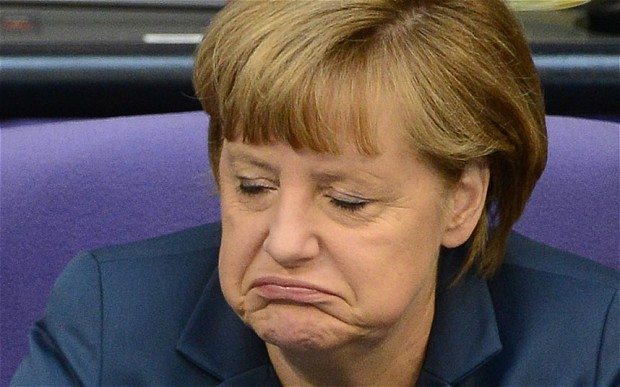But the frustration in her voice was clear enough after a week in which several European allies broke ranks, and in a public challenge to Germany, effectively declared the era of deficit reduction in Europe to be over, reports The Telegraph.
“I call it balancing the budget,” the German chancellor told her audience at a book presentation. “Everyone else is using this term austerity. That makes it sound like something truly evil.”
Five months before Germany holds an election, Ms Merkel finds herself under fire from European partners and the centre-left opposition at home for continuing to insist that euro members “do their homework” – Berlin-speak for reining in spending and enacting deep structural reforms.
There are signs the criticism is beginning to grate. German officials turn testy when the word “austerity” is mentioned these days. In recent months, they have deliberately adjusted their language, adopting the term “growth-friendly consolidation” to describe their policy approach.
But Merkel’s appearance in Berlin, and the reaction of her closest allies to suggestions by the European Commission that euro member states loosen their fiscal reins, shows Germany will not soften its position.
“Declaring an end to consolidation is absolute nonsense,” Michael Fuchs, deputy leader for Merkel’s Christian Democrats (CDU) in parliament, told Reuters. “In truth no one is really saving anyway, they’re just issuing less debt than before.”
German Foreign Minister Guido Westerwelle, speaking in Brussels, criticised Commission President Jose Manuel Barroso for saying that austerity had “reached its limits”.
Mr Barroso’s remarks on Monday came days after his colleague Olli Rehn said Europe’s G20 partners were “preaching to the converted” in urging the bloc to shift away from a savings-first approach.
“We are convinced that if we give up on budget consolidation in Europe and return to the old approach of more and more debt, then we would cement mass-unemployment over a period of many years,” Mr Westerwelle said.
In their defence, German officials pointed to data released by Eurostat, the EU statistical office, showing that government debt in the eurozone actually rose to 90.6pc of gross domestic product (GDP) last year from 87.3pc the year before.
However, the same report showed that the bloc-wide deficit as a percentage of GDP fell back to 3.7pc last year, from 4.2pc in 2011 and 6.2pc in 2010.
The German government’s critics see these figures, and the unrelenting downward spiral in southern Europe, as proof that consolidation has gone far enough.
The eurozone economy is expected to shrink for the second year running in 2013. And more than one in four Greeks and Spaniards are without a job – a situation that Greens leader Juergen Trittin said risked tearing Europe apart.
Peter Bofinger, a member of the “wise men” council of economic advisers and a leading critic of the government’s policies, also voiced doubts.
“There isn’t a single indicator I can find that suggests this policy of aggressive deficit reduction is working,” he told Reuters.
He said the German economy had done well because Merkel’s government had not imposed the same cuts at home that it was demanding of its partners.
But Merkel and her allies fear that if they lessen the pressure, fellow eurozone members could abandon their consolidation drives altogether, stirring anxiety in financial markets and rekindling the crisis in the heart of the currency bloc.
Both France and Spain fell short of their deficit goals last year. With Germany’s tacit approval, they are expected to be given more time to reach an EU target of 3pc of GDP.
But additional leeway from Berlin is not on the cards, officials say, unless French President Francois Hollande shows more commitment to spending cuts and structural reforms, including changes to rules governing the French labour market.
“France worries us above all,” Norbert Barthle, a budget expert in Merkel’s CDU, told Reuters. “It now looks like they need another year. We’re willing to accept that but it can’t go any further.”
Gerda Hasselfeldt, leader of the Bavarian Christian Social Union (CSU) in parliament, said Germany was watching France “intensively and with a degree of concern”.
“In my view, the necessary reforms are not being implemented with sufficient vigour,” she said.


